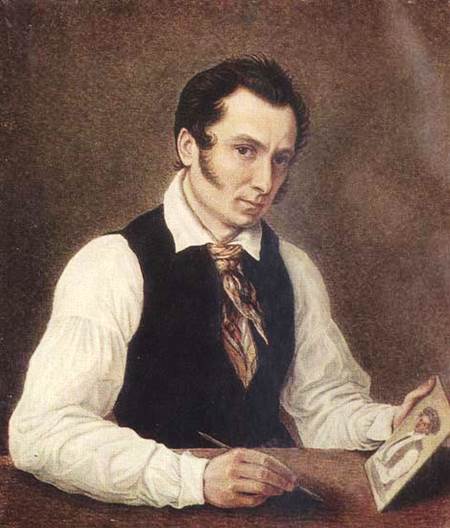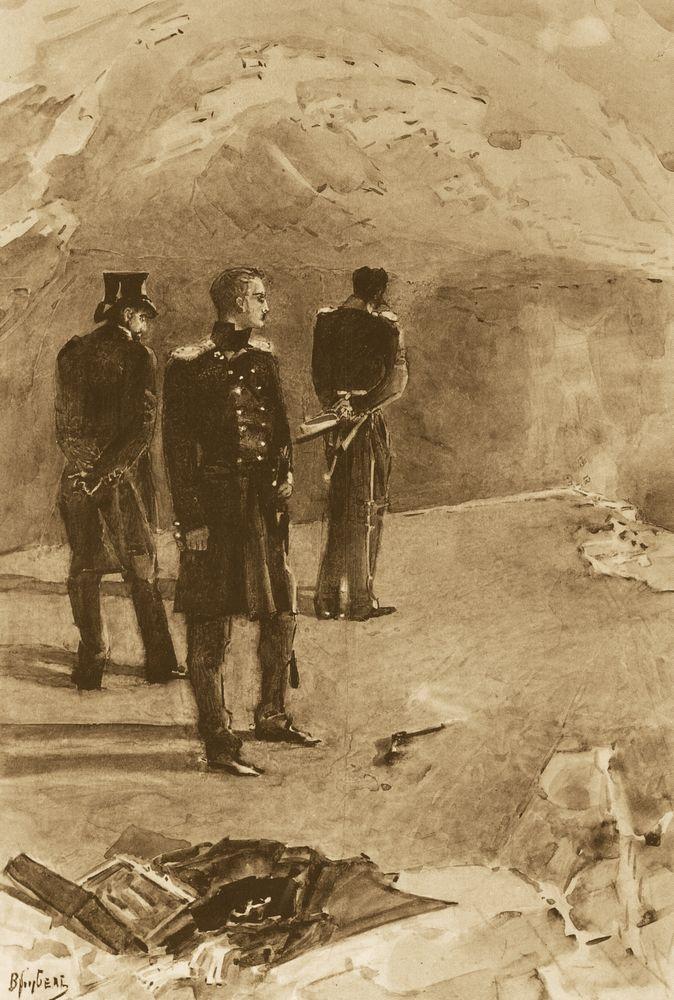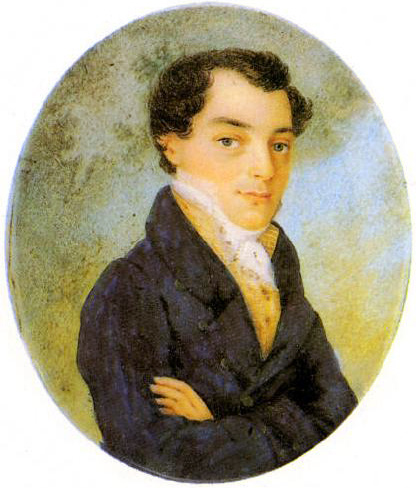|
Aleksandr Bestuzhev
Alexander Alexandrovich Bestuzhev ( rus, Алекса́ндр Алекса́ндрович Бесту́жев, p=bʲɪˈstuʐɨf, a=Ru-Alyeksandr Alyeksandrovich Byestuzhyev.oga; (), was a Russian writer and Decembrist. After the Decembrist revolt he was sent into exile to Caucasus where Russian Empire was waging the war against the Circassians. There writing under the pseudonym Marlinsky ( rus, Марли́нский, p=mɐrˈlʲinskʲɪj, a=Ru-Alyeksandr Alyeksandrovich Marlinskiy.oga) he became known as a romantic poet, short story writer and novelist. He was killed there in a skirmish. Biography Alexander Bestuzhev came from the rich and noble Bestuzhev family. He received an excellent education. From a very young age his father prepared him for military service. Since he was not keen on mathematics he failed to enter the navy and began to serve as a dragoon in the Guard. In 1818 he was promoted to officer, he also served as aide-de-camp to several senior officers and he ... [...More Info...] [...Related Items...] OR: [Wikipedia] [Google] [Baidu] |
:Template:Infobox Writer/doc
Infobox writer may be used to summarize information about a person who is a writer/author (includes screenwriters). If the writer-specific fields here are not needed, consider using the more general ; other infoboxes there can be found in :People and person infobox templates. This template may also be used as a module (or sub-template) of ; see WikiProject Infoboxes/embed for guidance on such usage. Syntax The infobox may be added by pasting the template as shown below into an article. All fields are optional. Any unused parameter names can be left blank or omitted. Parameters Please remove any parameters from an article's infobox that are unlikely to be used. All parameters are optional. Unless otherwise specified, if a parameter has multiple values, they should be comma-separated using the template: : which produces: : , language= If any of the individual values contain commas already, add to use semi-colons as separators: : which produces: : , ps ... [...More Info...] [...Related Items...] OR: [Wikipedia] [Google] [Baidu] |
Nikolay Bestuzhev
Nikolay Alexandrovich Bestuzhev (Russian: Николай Александрович Бестужев; 13 April 1791, Saint Petersburg – 27 May 1855, Novoselenginsk) was a Russian Navy officer, writer, inventor and portrait artist; associated with the Decembrist revolt. Biography He was born to a noble family. His father, , was a writer and government councilor. His brothers, Alexander, , , and were also writers, military officers and Decembrists. He entered the Sea Cadet Corps school in 1802 and graduated in 1809. While there, he audited classes taught by Andrey Voronikhin at the Imperial Academy of Arts. In 1810, he became a Lieutenant in the Corps. In 1815, he participated in naval actions in the Netherlands. He was appointed an Assistant Superintendent for the Baltic lighthouse in Kronstadt in 1820. [...More Info...] [...Related Items...] OR: [Wikipedia] [Google] [Baidu] |
Lord Byron
George Gordon Byron, 6th Baron Byron (22 January 1788 – 19 April 1824), known simply as Lord Byron, was an English romantic poet and Peerage of the United Kingdom, peer. He was one of the leading figures of the Romantic movement, and has been regarded as among the greatest of English poets. Among his best-known works are the lengthy Narrative poem, narratives ''Don Juan (poem), Don Juan'' and ''Childe Harold's Pilgrimage''; many of his shorter lyrics in ''Hebrew Melodies'' also became popular. Byron was educated at Trinity College, Cambridge, later traveling extensively across Europe to places such as Italy, where he lived for seven years in Venice, Ravenna, and Pisa after he was forced to flee England due to lynching threats. During his stay in Italy, he frequently visited his friend and fellow poet Percy Bysshe Shelley. Later in life Byron joined the Greek War of Independence fighting the Ottoman Empire and died leading a campaign during that war, for which Greeks rev ... [...More Info...] [...Related Items...] OR: [Wikipedia] [Google] [Baidu] |
A Hero Of Our Time
''A Hero of Our Time'' ( rus, Герой нашего времени, links=1, r=Gerój nášego vrémeni, p=ɡʲɪˈroj ˈnaʂɨvə ˈvrʲemʲɪnʲɪ) is a novel by Mikhail Lermontov, written in 1839, published in 1840, and revised in 1841. It is an example of the superfluous man novel, noted for its compelling Byronic hero (or antihero) Pechorin and for the beautiful descriptions of the Caucasus. There are several English translations, including one by Vladimir Nabokov and Dmitri Nabokov in 1958. Grigory Alexandrovich Pechorin Pechorin is the embodiment of the Byronic hero. Byron's works were of international repute and Lermontov mentions his name several times throughout the novel. According to the Byronic tradition, Pechorin is a character of contradiction. He is both sensitive and cynical. He is possessed of extreme arrogance, yet has a deep insight into his own character and epitomizes the melancholy of the Romantic hero who broods on the futility of existence and the ce ... [...More Info...] [...Related Items...] OR: [Wikipedia] [Google] [Baidu] |
Mikhail Lermontov
Mikhail Yuryevich Lermontov (; russian: Михаи́л Ю́рьевич Ле́рмонтов, p=mʲɪxɐˈil ˈjurʲjɪvʲɪtɕ ˈlʲɛrməntəf; – ) was a Russian Romantic writer, poet and painter, sometimes called "the poet of the Caucasus", the most important Russian poet after Alexander Pushkin's death in 1837 and the greatest figure in Russian Romanticism. His influence on later Russian literature is still felt in modern times, not only through his poetry, but also through his prose, which founded the tradition of the Russian psychological novel. Biography Mikhail Yuryevich Lermontov was born in Moscow into the respectable noble family of Lermontov, and he grew up in the village of Tarkhany (now Lermontovo in Penza Oblast). His paternal family descended from the Scottish family of Learmonth, and can be traced to Yuri (George) Learmonth, a Scottish officer in the Polish–Lithuanian service who settled in Russia in the middle of the 17th century. He had been captur ... [...More Info...] [...Related Items...] OR: [Wikipedia] [Google] [Baidu] |
Alexandre Dumas
Alexandre Dumas (, ; ; born Dumas Davy de la Pailleterie (), 24 July 1802 – 5 December 1870), also known as Alexandre Dumas père (where '' '' is French for 'father', to distinguish him from his son Alexandre Dumas fils), was a French writer. His works have been translated into many languages and he is one of the most widely read French authors. Many of his historical novels of adventure were originally published as serials, including '' The Count of Monte Cristo'', ''The Three Musketeers'', ''Twenty Years After'' and '' The Vicomte of Bragelonne: Ten Years Later''. His novels have been adapted since the early twentieth century into nearly 200 films. Prolific in several genres, Dumas began his career by writing plays, which were successfully produced from the first. He also wrote numerous magazine articles and travel books; his published works totalled 100,000 pages. In the 1840s, Dumas founded the Théâtre Historique in Paris. His father, General Thomas-Alexandre Dumas D ... [...More Info...] [...Related Items...] OR: [Wikipedia] [Google] [Baidu] |
Polar Star (Decembrist Journal)
''Polar Star'' was a Russian language literary almanac, published in Saint Petersburg from 1822 to 1825. The full title in Russian was ''Полярная звезда. Карманная книжка для любительниц и любителей русской словесности'' (Polar star. A pocket book for lovers of Russian literature). The main editors were Alexander Bestuzhev and Kondraty Ryleyev Kondraty Fyodorovich Ryleyev, also spelled Kondraty Feodorovich Ryleev (, September 29 (September 18 O.S.), 1795 – July 25 (July 13 O.S.), 1826) was a Russian poet, publisher, and a leader of the Decembrist Revolt, which attempted to over .... References 1822 establishments in the Russian Empire Annual magazines Defunct literary magazines published in Europe Defunct magazines published in Russia Magazines established in 1822 Magazines disestablished in 1825 Magazines published in Saint Petersburg Russian-language magazines Literary magazines publis ... [...More Info...] [...Related Items...] OR: [Wikipedia] [Google] [Baidu] |
Almanac
An almanac (also spelled ''almanack'' and ''almanach'') is an annual publication listing a set of current information about one or multiple subjects. It includes information like weather forecasts, farmers' planting dates, tide tables, and other tabular data often arranged according to the calendar. Celestial figures and various statistics are found in almanacs, such as the rising and setting times of the Sun and Moon, dates of eclipses, hours of high and low tides, and religious festivals. The set of events noted in an almanac may be tailored for a specific group of readers, such as farmers, sailors, or astronomers. Etymology The etymology of the word is disputed. The earliest documented use of the word in any language is in Latin in 1267 by Roger Bacon, where it meant a set of tables detailing movements of heavenly bodies including the Moon. It has been suggested that the word ''almanac'' derives from a Greek word meaning ''calendar''. However, that word appears only o ... [...More Info...] [...Related Items...] OR: [Wikipedia] [Google] [Baidu] |
Decembrist Revolt
The Decembrist Revolt ( ru , Восстание декабристов, translit = Vosstaniye dekabristov , translation = Uprising of the Decembrists) took place in Russia on , during the interregnum following the sudden death of Emperor Alexander I. Alexander's heir apparent, Konstantin, had privately declined the succession, unknown to the court, and his younger brother Nicholas decided to take power as Emperor Nicholas I, pending formal confirmation. While some of the army had sworn loyalty to Nicholas, a force of about 3,000 troops tried to mount a military coup in favour of Konstantin. The rebels, although weakened by dissension between their leaders, confronted the loyalists outside the Senate building in the presence of a large crowd. In the confusion, the Emperor's envoy, Mikhail Miloradovich, was assassinated. Eventually, the loyalists opened fire with heavy artillery, which scattered the rebels. Many were sentenced to hanging, prison, or exile to Siberia. The cons ... [...More Info...] [...Related Items...] OR: [Wikipedia] [Google] [Baidu] |
Kondraty Ryleyev
Kondraty Fyodorovich Ryleyev, also spelled Kondraty Feodorovich Ryleev (, September 29 (September 18 Julian calendar, O.S.), 1795 – July 25 (July 13 Julian calendar, O.S.), 1826) was a Russians, Russian poet, publisher, and a leader of the Decembrist Revolt, which attempted to overthrow the Russian monarchy in 1825. Early life Ryleyev was born in the village of Gatchinsky District, Batovo, now part of Gatchinsky District, Leningrad Oblast. His father, Fyodor Ryleyev, was an impoverished nobleman, a small landowner, who was later employed as the manager of one of Prince Golitsyn's estates. In spite of his family's pecuniary difficulties, Ryleyev was able to study at the Page Corps, Corps des Pages, an elite military academy attended only by members of the nobility, in Saint Petersburg. After his graduation, Ryleyev was awarded a commission in the First Cavalry Company of the First Reserve Artillery Brigade. He participated in the foreign campaigns of 1814 and 1815, seeing act ... [...More Info...] [...Related Items...] OR: [Wikipedia] [Google] [Baidu] |
Aleksander Griboyedov
Alexander Sergeyevich Griboyedov (russian: Александр Сергеевич Грибоедов, ''Aleksandr Sergeevich Griboedov'' or ''Sergeevich Griboyedov''; 15 January 179511 February 1829), formerly romanized as Alexander Sergueevich Griboyedoff, was a Russian diplomat, playwright, poet, and composer. He is recognized as ''homo unius libri'', a writer of one book, whose fame rests on the verse comedy ''Woe from Wit'' or ''The Woes of Wit''. He was Russia's ambassador to Qajar Persia, where he and all the embassy staff were massacred by an angry mob as a result of the rampant anti-Russian sentiment that existed through Russia's imposing of the Treaty of Gulistan (1813) and Treaty of Turkmenchay (1828), which had forcefully ratified for Persia's ceding of its northern territories comprising Transcaucasia and parts of the North Caucasus. Griboyedov had played a pivotal role in the ratification of the latter treaty. Early life Griboyedov was born in Moscow, the exact year unk ... [...More Info...] [...Related Items...] OR: [Wikipedia] [Google] [Baidu] |








